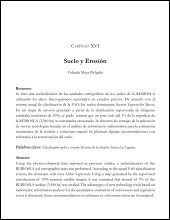MICROBIOLOGÍA DEL MANGLAR
MICROBIOLOGY OF MANGROVE
Author
GINA HOLGUIN ZEHFUSS
PATRICIA VAZQUEZ CORREA
YOSSEF LOPEZ DE LOS SANTOS
ALFONSO DÁVILA LULE
Metadata
Show full item recordAbstract
"Los manglares son ecosistemas de alta productividad primaria, ricos en materia orgánica, pero deficientes en nitrógeno y fósforo. Esta productividad ha sido parcialmente explicada por la presencia de un eficiente sistema de reciclaje de nutrientes efectuado a través de la actividad microbiana. A su vez los exudados radicales de las plantas sirven como fuente de alimento para los microorganismos, estableciéndose así una relación mutuamente benéfica. En el presente capítulo se reportan investigaciones sobre la comunidad microbiana de manglar en Bahía Balandra como bacterias fijadoras de nitrógeno (BFN), desnitrificantes, solubilizadoras de fosfatos (BSF), sulfato reductoras, productoras de moléculas señal, de sustancias reguladoras de crecimiento vegetal y antibióticos. Estas investigaciones apoyan la hipótesis que la existencia de estos grupos es de vital importancia para el funcionamiento del ecosistema. Así mismo, se destacan aspectos como la mayor actividad para ciertos grupos funcionales (BFN y BSF) cuando se cultivan juntos y la mediación de moléculas señal tipo acil homoserinas lactonas (AHLs). El conocimiento de la estrecha relación microorganismo-nutriente-planta ofrece perspectivas para su potencial utilización en planes de conservación y restauración de estos ambientes marinos." "Mangroves are highly productive ecosystems and rich in organic matter, but they are nutrient-deficient in nitrogen and phosphorus. This productivity has been partially explained by an efficient cycling system of nutrients through microbial activity. In turn, plant-root exudates serve as food source for microorganisms, which establish a mutual and beneficial relationship. This chapter reports studies about the mangrove microbial community at Bahía Balandra, such as nitrogen fixing-bacteria (NFB), denitrifying-bacteria, phosphate-solubilizing bacteria (PSB), sulfate-reducing bacteria, signal molecules produced by bacteria, and substances that regulate plant growth and antibiotics. Researches support the hypothesis that these microbial groups play an essential role in the functioning of the ecosystem. Likewise, we emphasize aspects such as major activity for some functional groups (NFB and PSB) when both are grown together and the mediation of signal molecules such as acyl-homoserine lactones (AHLs). Knowledge of the close relationship of microorganism-nutrient-plant interaction offers important perspectives for the potential use of these marine coastal environments in conservation and restoration plans."
Collections
Related items
Showing items related by title, author, creator and subject.
-
PROMOCIÓN DEL PERIFITON PARA EL CULTIVO DE CAMARÓN BLANCO: HACIA UNA ACUICULTURA ECOLÓGICA
DOMENICO VOLTOLINA LOBINA; JUAN MANUEL AUDELO NARANJO; MARIA DEL ROSARIO PACHECO MARGES -
Suelo y Erosión
YOLANDA LOURDES MAYA DELGADO


